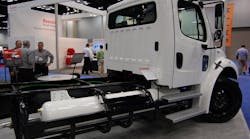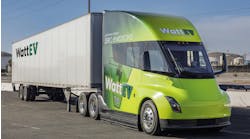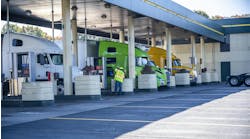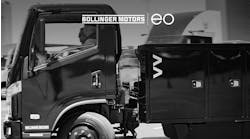Alternative fuels have traditionally filled their individual places in the trucking world. Liquefied natural gas (LNG) seems to work best in long-haul trucking operations; compressed natural gas (CNG) in shorter-haul operations. Hydrogen fuel is finding some success in port operation. And propane autogas has been relegated primarily to light duty vehicles and school buses.
“The truth of the matter is there is room for both CNG and propane applications,” Roy Willis, president & CEO of the Propane Education & Research Council (PERC) told Fleet Owner. “The question is which one is right for which application?”
Propane autogas is best in fleet applications where there is a central refueling location. The fuel has found favor with local service fleets such as Sears and most recently satellite TV provider Dish Network, which will put into service 200 Roush CleanTech propane autogas-powered Ford E-250 vans this year.
“We’re very encouraged by what we’re seeing in the marketplace by a number of very large fleets [switching to propane], Dish Network being the latest,” Willis said.
Propane has also become a popular fuel choice for school bus fleets, Willis pointed out, noting that propane is a low-carbon fuel and provides fuel savings, giving it a “win-win” scenario for anyone choosing to power its vehicles with it.
In fact, about 10% of all buses sold by Blue Bird Corp. are now propane powered. Thomas Built Buses will be introducing a propane option later this year, Willis said.
But it is recent developments that have propane supporters excited: the introduction of propane power into medium-duty applications.
Up until now, most commercial propane-powered vehicles have been vans, the Ford E-Series is a popular option. But a new Ford F-59 stripped cab chassis available with a propane-powered 6.8L, V10 engine from Roush CleanTech that uses a 67 usable gal. fuel tank has opened up the medium-duty market. According to Willis, the vehicle, now available with a 30,000 GVW rating, is suited to fleet delivery applications.
And another entry, this one from CleanFuel USA and Freightliner Custom Chassis Corp. (FCCC), will bring a 33,000 GVW vehicle to market.
The vehicle, built on FCCC’s S2G chassis, is equipped with CleanFuel’s liquid propane-injected engine technology. First introduced at the 2012 NTEA Work Truck Show in Indianapolis, the vehicle could be certified by EPA later this spring or early summer, Willis said. Limited production could start this summer with full production available in the fall, he added.
“The S2G was developed in response to significant industry interest for an LPG solution without retrofitting or aftermarket additions,” FCCC president Bob Harbin said of the vehicle at the Work Truck Show. “In offering the only original equipment manufacturer LPG solution for medium-duty applications, we believe the S2G will meet our customers’ needs. The S2G also perfectly fits into FCCC’s heritage as a custom chassis manufacturer with a successful history in alternative fuel powertrains.”
The platform includes an 8L, 325-hp. engine and utilizes the Freightliner M2 cab, which features a sloped, forward-tilting hood for superior visibility and easy engine access. It has a gross vehicle weight rating (GVWR) of 33,000 lbs. and comes equipped with an Allison 2300 automatic transmission with PTO provision.
“We have two entries into that medium-duty marketplace this year,” Willis said. “In certain locations, we’re getting excellent reports in terms of horsepower and torque compared to diesel and gas counterparts.
“We know a number of package delivery companies are already looking at these vehicles and are anticipating pilot projects,” he added.



